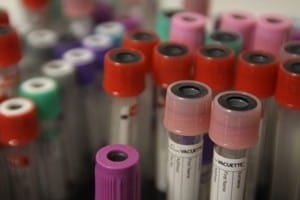 Those in the field of pharmacy technology realize the vast importance of identifying the underlying causes of diseases. For pharmaceutical companies to research and develop effective drugs, they must first have an idea of what to address within the human body. Otherwise, creating drugs that treat specific diseases and conditions is a seemingly impossible game of elimination. This is particularly true with Alzheimer’s disease, a complicated form of dementia that affects more than 5 million people in the U.S. alone. Scientists have been working to find the biological factors that contribute to this disease, which has led to a number of recent promising drug trials and methods for identifying Alzheimer’s before symptoms occur. New research published in The Journal of the Federation of American Societies for Experimental Biology shows that a simple blood test may be able to predict Alzheimer’s disease a decade before a person exhibits symptoms.1 What’s more, the team of researchers was able to identify participants from the study – whether the subject had Alzheimer’s, diabetes or was healthy – with 100 percent accuracy. While the test is not a prevention or treatment method, it does provide scientists with some insight as to trends between those with Alzheimer’s and individuals without the disease. Due to distinct differences in levels of a protein in the bloodstream, pharmaceuticals companies may be able to try and create treatments that regulate or alter this factor in those predicted to have Alzheimer’s disease.
Those in the field of pharmacy technology realize the vast importance of identifying the underlying causes of diseases. For pharmaceutical companies to research and develop effective drugs, they must first have an idea of what to address within the human body. Otherwise, creating drugs that treat specific diseases and conditions is a seemingly impossible game of elimination. This is particularly true with Alzheimer’s disease, a complicated form of dementia that affects more than 5 million people in the U.S. alone. Scientists have been working to find the biological factors that contribute to this disease, which has led to a number of recent promising drug trials and methods for identifying Alzheimer’s before symptoms occur. New research published in The Journal of the Federation of American Societies for Experimental Biology shows that a simple blood test may be able to predict Alzheimer’s disease a decade before a person exhibits symptoms.1 What’s more, the team of researchers was able to identify participants from the study – whether the subject had Alzheimer’s, diabetes or was healthy – with 100 percent accuracy. While the test is not a prevention or treatment method, it does provide scientists with some insight as to trends between those with Alzheimer’s and individuals without the disease. Due to distinct differences in levels of a protein in the bloodstream, pharmaceuticals companies may be able to try and create treatments that regulate or alter this factor in those predicted to have Alzheimer’s disease.
The research
Researchers gathered blood samples from 174 individuals: 70 with Alzheimer’s disease, 20 with diabetes and 84 healthy adults.1 Researchers then identified exosomes that originated in the brain and isolated an insulin receptor known as IRS-1. The team found that each category of participants had distinctly different levels of an inactive form of IRS-1. While those with Alzheimer’s had high levels of the insulin receptor in their blood, healthy individuals had low levels and those with diabetes had intermediate levels. These levels varied enough for scientists to be able to identify if a participant was healthy, diabetic or suffering from Alzheimer’s with 100 percent accuracy. However, the sample size for this study was relatively small. The research team is quick to acknowledge that additional trials will have to be done on a much larger scale, though they’re optimistic that the results will hold. If it proves effective after further testing, it could become a standard measure for catching Alzheimer’s before the signs of the disease start. While currently there are limited preventative measures that can be taken to completely halt the onset of Alzheimer’s, it would give people ample opportunity to make changes in lifestyle that could slow the disease. Moreover, health care professionals, researchers and pharmaceutical companies continue to look for a cure. “My vision of the future is you have your breakfast cereal, and on one side you have a statin for cardiovascular disease, and on the other side you have three pills to prevent dementia,” Dr. Ed Goetzl, senior study author told Time. “What I can see in this disease process is it’s far too complicated for a single magic bullet. The reason we’re trying to mine all these different pathogenic mechanisms is because I think they’re going to have to have at least two or maybe three targets against which a drug is directed.”2 Scientists still have much to uncover about the human body. However, as we unveil more underlying trends that cause diseases and other ailments, we can better create effective treatment options.
1 “Dysfunctionally phosphorylated type 1 insulin receptor substrate in neural-derived blood exosomes of preclinical Alzheimer’s disease,” by Dimitrios Kapogiannis, Adam Boxer, Janice Schwartz, Erin Abner, Arya Biragyn, Umesh Masharani, Lynda Frassetto, Ronald Petersen. Bruce Miller, Edward Goetzl, The Journal of the Federation of American Societies for Experimental Biology, Oct. 23, 2014. http://www.fasebj.org/content/early/2014/10/23/fj.14-262048.abstract
2 “New test may predict Alzheimer’s 10 years before diagnosis,” by Mandy Oaklander, Time, Nov. 17, 2014. http://time.com/3590494/alzheimers-blood-test/



